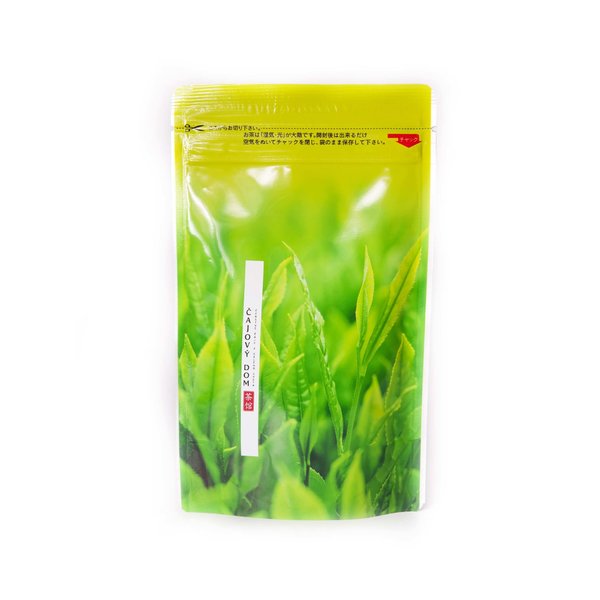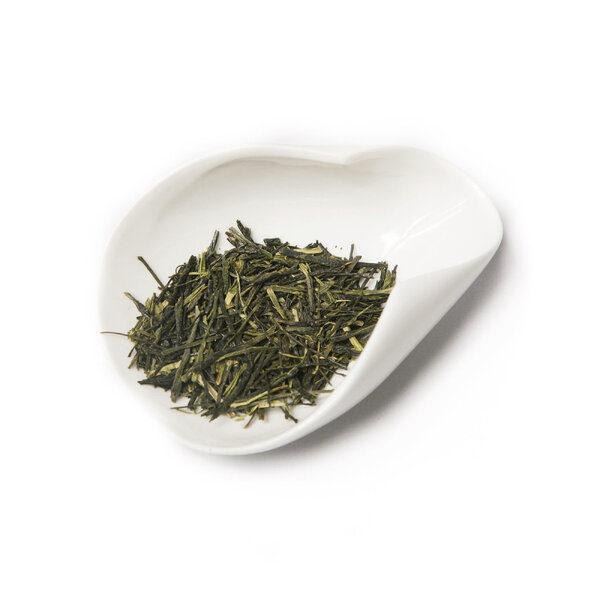Japan Gaba Midori - 50g
-
Harvest Year 2025
-
Country of Origin Japan
-
Type of Tea Green Tea
-
Total Price: 21.00 € (including VAT)
Green tea from our own production in Shizuoka, Japan, with a high content of gamma-aminobutyric acid (GABA). It is made using a special method in which part of the tea leaf processing takes place without access to air, the so-called "anaerobic process", which increases the content of gamma-aminobutyric acid (GABA) in the tea leaves. This method was first developed in Japan in 1983 by Dr. Tsushid and his team. The result is a tea with a distinctive character and a unique production technology.
The tea leaves come from organic cultivation and are characterized by a dark green color and a fruity-creamy aroma reminiscent of apricots.
After steeping, buttery-fruity notes develop with a hint of yellow melon or baked pumpkin. The infusion has a yellowish color and a gentle fruity acidity, which gives way to a sweeter taste in subsequent infusions. The tea is suitable for multiple steepings.
In order for a tea to be called GABA (gamma-aminobutyric acid), it must contain at least 150 mg GABA per 100 g of leaf. In Japan, GABA teas have an average of 200 mg / 100 g. According to laboratory analysis, our GABA teas reach up to 420 mg GABA / 100 g.
Origin: Japan
Type: green tea (GABA)
Ingredients: 100% green tea (Camellia sinensis)
THE TEA IS FROM OUR OWN PRODUCTION.
REGULATION (EC) No 1924/2006 OF THE EUROPEAN PARLIAMENT AND OF THE COUNCIL of 20 December 2006 on nutrition and health claims made on foods unfortunately prohibits us from making more specific health claims, except for those approved by it. Therefore, we do not make any other claims, even those that have been known and proven over the centuries.
Tea Preparation for Multiple Infusions
-
Tea Quantity 5 g
-
Water Quantity 100 ml
-
Water Temperature 60 - 70 °C
-
Brewing Time 60s, 5s, 10s, 20s, 30s, 60s
-
Number of Infusions 5 - 6
-
Tea Characteristic upokojujúci
Tea Preparation for Single Infusion
-
Tea Quantity 5 g
-
Water Quantity 0,5 l
-
Water Temperature 70 - 80 °C
-
Brewing Time 2 - 3 min.
-
Number of Infusions 1 max. 2
-
Tea Characteristic upokojujúci
GABA was first developed in Japan in 1983 by Dr. Tsushido and his team at the National Agricultural Research Institute in Japan. The innovation was a special anaerobic fermentation process that increases the natural content of gamma-aminobutyric acid (GABA) in tea leaves. Since then, GABA tea has become a recognized category within Japanese tea culture and is known for its unique processing method and composition.
GABA (gamma-aminobutyric acid) is a naturally occurring compound in the human body that belongs to the so-called neurotransmitters - substances that transmit signals between nerve cells. It functions as the main inhibitory neurotransmitter in the central nervous system, which means that it reduces the activity of neurons and contributes to the balance of nerve transmission.
Its role is widely recognized in neuroscience and physiology as part of the body's natural regulatory mechanisms.
GABA is naturally produced in tea through a special processing method in an oxygen-free environment (called anaerobic fermentation), which activates natural enzymes in the tea leaves.
In order for a tea to be labeled "GABA tea", it must contain at least 150 mg of GABA per 100 g of dry matter. In practice, values range from 150–450 mg / 100 g. In one experiment a few years ago, we even managed to achieve a value of 600 mg / 100 g.
GABA is a common component of the human body and is also found naturally in some fermented foods such as kimchi, tempeh, fermented rice or some types of tea.
More information about GABA:
https://sk.wikipedia.org/wiki/Kyselina_gama-aminomaslov%C3%A1
https://en.wikipedia.org/wiki/GABA
https://www.sciencedirect.com/science/article/pii/S1756464619305936
https://www.psychologytoday.com/us/blog/sleep-newzzz/201901/3-amazing-benefits-gaba



